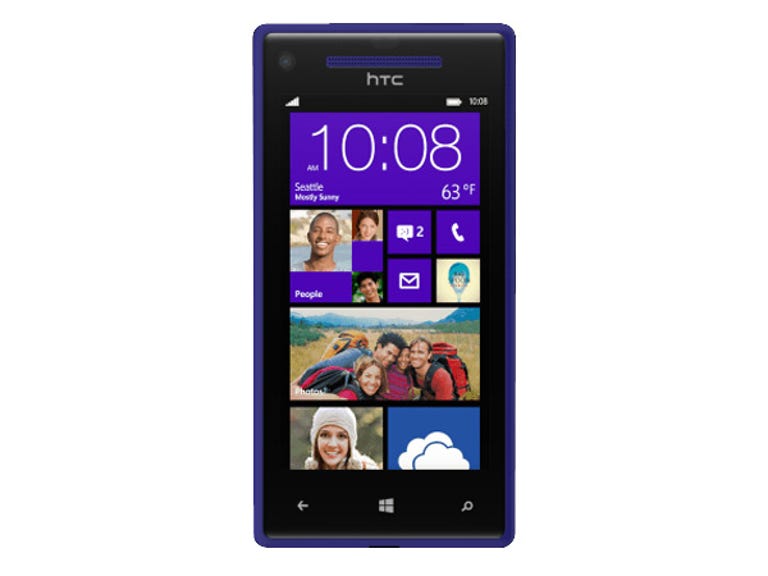 Why You Can Trust CNET
Why You Can Trust CNET HTC Windows Phone 8X review: HTC Windows Phone 8X
HTC's Windows Phone 8X needed that "one more thing" to justify its place among the premium phones, but fails to deliver. It's a good phone, just not a great one.
Design
If you can't beat them, join them. HTC has opted for the same coloured polycarbonate chassis design that Nokia has made popular with its Lumia line, and in true HTC style, it makes it its own. The Windows Phone 8X may have a smaller screen compared to the Nokia Lumia 920 — 4.3-inch compared with 4.5-inch — but many tossing up between the two phones will appreciate how much lighter the HTC is. At 130-grams, the Windows Phone 8X is nearly 50 per cent lighter than Nokia's flagship, and it's a noticeable difference.
The Good
The Bad
The Bottom Line
Even though it has the smaller screen, the 8X shares the same footprint that we've seen on other phones this year. Laying it on the Motorola Razr HD, the handsets are the same width and height, though the 8X has a much larger bezel surrounding its Super LCD display. This makes the screen look long, but not in an awkward way. Visually, the screen is stunning, with rich, bright colours popping off the screen's deep blacks. Nokia may have spent more time and words describing its PureMotion HD display, but there is almost no discernible difference in the quality of these screens as far as we can tell.
We do think the 8X feels uncomfortable, though. The handset's design is a single, tapered dome, and this gives the phone rather sharp corners all the way around. Not skin-piercing, blood-gushing sharp, but enough so that it sits awkwardly against the curves of your hand. Nokia's phone may be heavier, but we'd argue that it has better ergonomics.
It's unibody design also means that the phone's battery is sealed within the chassis, which may or may not bother you. There is no expandable memory slot either, which we find more troublesome.
User experience
If you read our review of the Lumia 920, you should have a pretty good idea of what we have to say about the user experience on the Windows Phone 8X. If you covered both phones so that only the screens were visible, there would be very little to let you know which phone was which. The 8X offers the same slick, buttery-smooth user experience that we enjoyed when we reviewed the Lumia 920, thanks to it having the same dual-core 1.5GHz Qualcomm processor as the Nokia and the same 1GB RAM.
The inclusion of HTC designed applications — and the absence of Nokia-made apps — is what sets these phones apart. But in a battle of apps, HTC loses out — big time. While Nokia includes internally developed maps, music and camera lenses, not to mention several exclusive third-party titles like Angry Birds Roost, HTC offers the same boring suite of tools that we saw when we last reviewed an HTC Windows Phone. It's Weather and Time app is pre-installed with a Live Tile centrally located on the start screen, and there are a few other tools ready to download in the Store, like a Flashlight and a unit converter. This is a lazy collection of apps, and it pales in comparison to Nokia's range.
HTC includes an 1800mAh capacity battery in the 8X, and while a battery this size proved insufficient in the One X handset we reviewed earlier in the year, it does the trick here with the 8X. We comfortably made it through a busy work day using the 8X, with juice to spare for some browsing before bed.
Camera
With so little to add to the Windows Phone equation, it is disappointing that HTC hasn't used the best of its camera technology. It does include the same dedicated HTC ImageChip technology we saw in the One X earlier this year, but the photos just don't look as good.
Using the camera may not give you this impression; the software is clean and smooth, and taking photos is pleasingly fast. But, the photos that the rear-facing 8-megapixel camera takes just aren't that great. Colours are especially troublesome, with most of our photos spoiled by a yellow-greenish hue — possibly a problem with the auto white balance settings. It struggled with mixed temperatures in an image, with whites flaring in a number of our outdoor shots. We also noticed that the auto-focus struggled with subjects at about a half-metre from the lens. There are no focus-mode settings either, so switching to Macro is not an option.
Interestingly, HTC has included quite an impressive front-facing camera. It sports a 2-megapixel sensor, but more importantly, it has a wide lens with f/2.0 aperture. This is a plus for video conferencing, but also for people who love taking selfies with groups of friends — you can see yourself in the viewfinder and get everyone in the shot.
Whites flare in this photo as the sensor struggles with the mix of temperatures in the image.
(Credit: CBSi)
(Credit: CBSi)
This photo was taken with the front facing camera.
(Credit: CBSi)
Overall
Based on the basics and its slick user experience, the HTC Windows Phone 8X is a decent smartphone, but the same can be said about all of the Windows Phone 8 devices we've seen so far. Even the cheaper HTC and Nokia phones have a fast, smooth UI, so at the premium price point, we are looking for a little more. The 8X just doesn't have that "one more thing" to recommend itself. HTC's bonus apps are a bland assortment of tools that you can otherwise download for free through third-parties on the Windows Store, and its camera, which should be great, is mediocre. If you don't mind the weight, we suggest you take a look at the Nokia Lumia 920.


